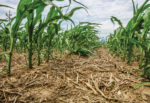Advertise Follow Us
Articles Tagged with ''conservation''
South Dakota: One State, Two Trends
An NRCS survey finds no-till acreage increased in the state by 29% overall between 2004 and 2013, but decreased where crop rotations shifted from small grains to corn and soybean plantings.
Read More
No-Till Movement In U.S. Continues To Grow
The most recent Census of Agriculture found no-tilled acres in the U.S. reached a new high of 96 million acres in 2012, but experts say obstacles remain to more consistent adoption of the practice.
Read More
What I've Learned from No-Tilling
Conservation: Not Just A Means To An End
Early no-till adopter Jerry Peery says he has a ‘moral obligation’ to protect and build soils on his Kentucky farm for future farming generations.
Read More








